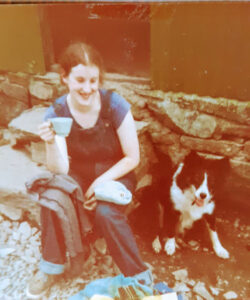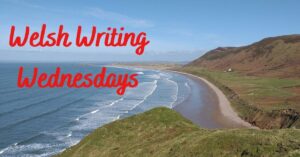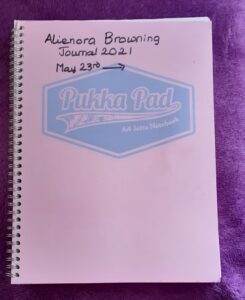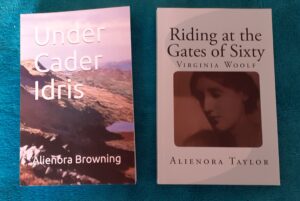I arrived in Aberystwyth train station, on October 3rd 1976, and, bathed in a sunset of extraordinary richness and colour, was driven up the Penglais Hill – by coach and surrounded by other students – to the Penbryn Halls of Residence.
Is it possible to fall in love with a place at first sight? Yes, it is – and I did! That first glimpse, stark hills rearing in the distance, struck a sweet blow to my heart – and, the very next day, seeing parts of the promenade painted with blazing autumn gold, as grey silken sea undulated nearby, ignited a passion for West Wales which has never left me.
But it was the language which shivered and undulated in watery mystery; which gave me the delights of the double ‘ll’, the mutations from the ‘M’ of ‘Machnylleth’ to ‘Fachynlleth’ when preceded by ‘Croeso y…’ and the other sibilant mysteries of this proud tongue.
I had already decided to read joint English and Philosophy – and, told that I needed a third subject for that crucial first year at university, opted for Welsh with excitement and anticipatory joy.
Welsh lessons took place in the Old College/Yr Hen Goleg – and so the learning of this new language was accompanied by the stunning glimpses of the sea, often wild and raging, throwing its waves high up against the venerable old building’s sides and windows, rattling fragile sashes and leaving salty trails on glass.
 Our teacher, Professor Edward (Tedi) Milward, was lovely – a gentle and knowledgeable soul who was a passionate advocate of this endangered language, and whose family I befriended during that first year in Wales.
Our teacher, Professor Edward (Tedi) Milward, was lovely – a gentle and knowledgeable soul who was a passionate advocate of this endangered language, and whose family I befriended during that first year in Wales.
From the very first lesson, I adored the sound of Welsh: its musicality; its sing-song quality; the subtle differences in pronunciation; the meanings of place names when broken down into their component parts.
At around the same time, I joined a university choir – and we learned a beautiful Welsh carol ‘Tua Bethlem Dref’ in readiness for what turned out to be a most moving and inspirational Christmas service in a local church.
Unfortunately, my passionate love of the language was not matched by any genuine learning ability – and, suspecting I would not gain that all-important pass in the subject, I made the difficult decision to give it up at the end of the first term, taking Classical Studies instead.
The odd thing is this: naturally musical, I learned the sounds – the inner song, if you like – of Welsh with ease, and, to this day, can read and pronounce it without any problem. But the ability to understand the rules, learn the words, tenses and so forth eluded me (as it had done, at school, for both French and Latin).
But, being given the key (or should that be the lyre?) for the plangent tones behind the language was a privilege and a life-long delight. Much of my enjoyment of the sublime landscape and magic of that area was filtered through the lilt and cadence of the language itself.
By a strange coincidence – and bringing things full circle – I got the part of the Lady of the Lake in a local Glastonbury production, back in 2018. Told that the character needed to enter the stage singing a solo, I opted for ‘Tua Bethlem Dref’ – and can recall vividly walking up the centre of the Town Hall, the words of that long-ago Welsh song ringing and echoing from my throat: a love song for a time, a place and an ancient language.



